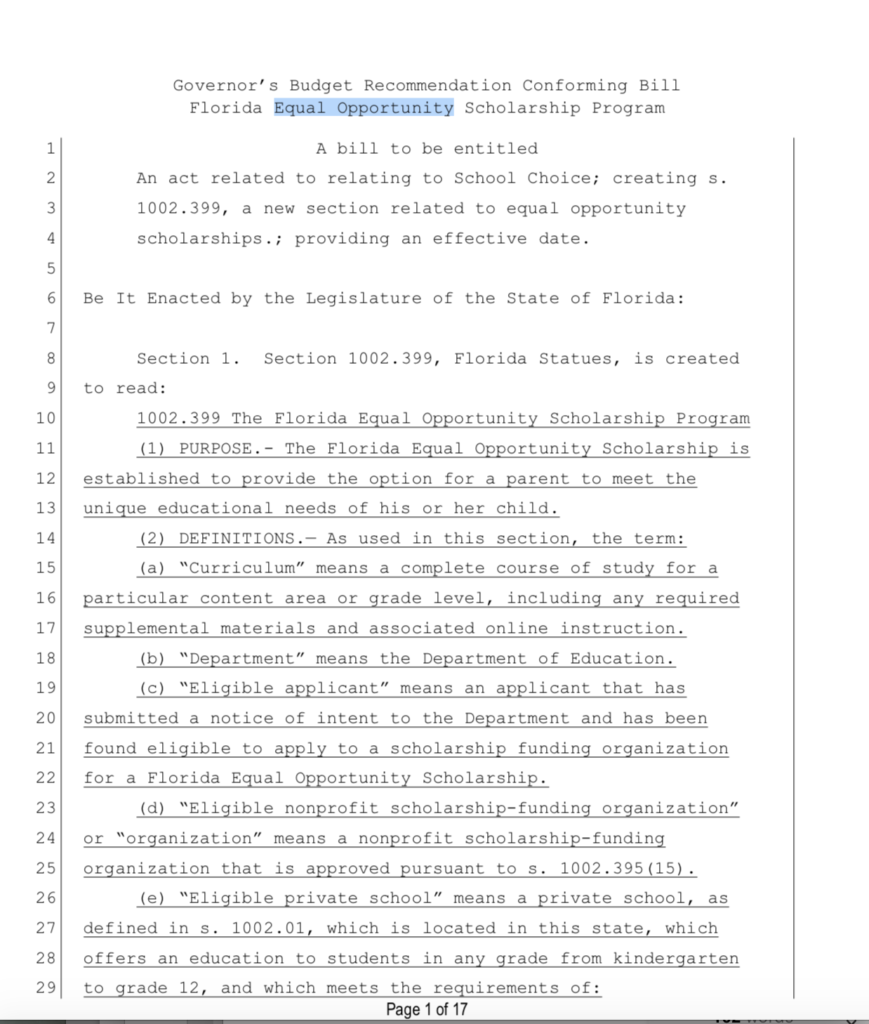Real Estate Bonanza: More Corporate Charter Welfare Hidden in Implementing Bills?
On Friday evening, 2/15/2019, Governor Ron DeSantis released his Budget Recommendation – Implementing Bill, which included the “Governor’s Budget Recommendation Conforming Bill – Schools of Hope.”
Question: Is it standard practice for a Governor to write new legislation or rewrite current Florida statute in a Budget Bill? We thought that was the job of the legislative branch?
For example, just hours after Governor DeSantis’ asked the Legislature to “send a bill to my desk that provides this equal opportunity for those folks who have not had the ability to access a good scholarship,” his office released what looks like an exact copy of that bill:

It appears that DeSantis’ office has done the Education committees’ job for them. The Governor’s Implementing Bill suggests other legislative changes as well, some more subtle than creating an entirely new voucher program. For example, it makes small but significant changes in the controversial Schools of Hope (SOH) program (f.s. 1002.333), changes that will significantly benefit SOH investors.
The “Schools of Hope” program was championed by now Commissioner of Education Richard Corcoran and was arguably the most controversial measure in 2017’s HB7069. Designed to entice out-of-state corporate charter chains to established networks throughout Florida, it set aside $140 million/year to encourage charter takeover of struggling schools, as well as allow the construction of new charter schools which would directly compete with struggling public schools (potentially hastening their demise).
To date, four “hope operators” have been chosen by the FLBOE but no new schools have been built. Three of the operators were from out of state: Democracy Prep Public Schools, Inc., IDEA Public Schools, KIPP New Jersey. Through a FLBOE loophole, Academica, Florida’s largest and most politically connected charter school chain, also qualified as a Hope Operator. After passage of HB7069, Corcoran celebrated “hope has arrived” but despite those promises it will still be years before the first “School of Hope” opens. The delay in “hope’s arrival” is not surprising; before HB7069 passed, charter operators were expressing their disinterest in participating in school takeovers in Florida.
Governor DeSantis’ recently recommended legislative changes (which, we suspect, are really Commissioner Corcoran’s proposed changes) will change Schools of Hope statute in four significant ways:
- Makes SOH eligible to receive charter school capital outlay in its first year and removes the restriction from using that charter capital outlay for the purchase or real property or for the construction of school facilities.
- Allows the use of SOH funds for hiring and compensating executive directors and regional directors, until the school reaches full enrollment.
- Changes the definition of a “persistently low-performing school” from a school earning three consecutive grades lower than a “C” one scoring less than a “C” in three of the last five years, targeting more public school for takeover.
- Allows Hope Operators to open schools in Florida Opportunity Zones, regardless of whether there are any persistently low public schools in the area.
That last item really caught our eye. Opportunity Zones were created in President Trump’s Tax Cuts and Jobs Act of 2017, allowing real estate investors to enjoy preferential tax treatment when investing in economically-distressed communities. The legislation has been referred to as a “bonanza” for investors and real estate consultants.
As explained in U.S. News and World Reports: “Ultimately, the tax benefits act as subsidies,” Uldricks says, “making projects that were not economically feasible into projects that are now feasible, as well as accelerating the inflow of capital to real estate development.” In the case of Schools of Hope, it will be all on the tax payer’s dime.
There are numerous examples of how charter school founders have become rich, using an array of financial tactics, especially involving school real estate deals. Several examples are discussed in a piece written by Stephen Rosenfeld, in “The National Memo,” which concluded:
“Tough to tell” where the non-profit and for-profit worlds blur is an apt warning for the coming wave of K-12 privatization under Trump. But what’s clear and not blurry is that these large and ambitious K-12 franchises are not always about educating kids. They’re about getting rich off taxpayers and calling that public education
http://www.nationalmemo.com/charter-school-operators-enrich-real-estate/?cn-reloaded=1
It appears the Governor’s Budget Recommendation Conforming Bill – Schools of Hope recommends amending f.s.1002.333 to allow Schools of Hope Operators to benefit from President Trump’s tax bill, making it easier for them to get rich off of Florida’s taxpayers’ funds.
A few questions:
- How many more financial enticements do we need to dangle before corporate charter chains before “hope arrives?” Are the tax benefits associated with Opportunity Zones meant to entice Schools of Hope here or merely make them more profitable?
- Is it standard practice for Governor’s offices to actually write the legislation they want passed? With Richard Corcoran as the Commissioner of Education, where does the executive branch end and the legislative branch begin?
- If charter school operators need so many financial incentives just to agree to come to Florida, perhaps there is something else keeping them away? Governor DeSantis has issued an Executive Order asking for a revue of the current standards; he should add a complete review of the Accountability system. Without a sound, ethical and equitable accountability system we will continue to see operators focused on gaming the system for profit rather than committed to seeing every Florida child receives the high quality public education they deserve.
